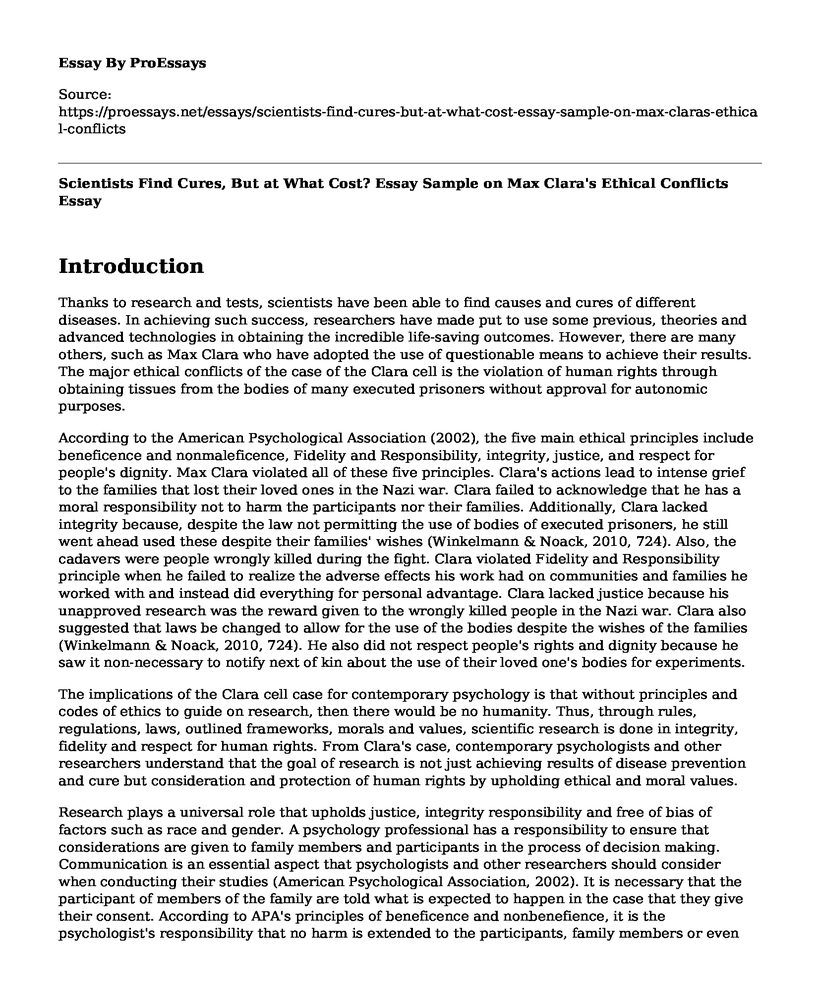Introduction
Thanks to research and tests, scientists have been able to find causes and cures of different diseases. In achieving such success, researchers have made put to use some previous, theories and advanced technologies in obtaining the incredible life-saving outcomes. However, there are many others, such as Max Clara who have adopted the use of questionable means to achieve their results. The major ethical conflicts of the case of the Clara cell is the violation of human rights through obtaining tissues from the bodies of many executed prisoners without approval for autonomic purposes.
According to the American Psychological Association (2002), the five main ethical principles include beneficence and nonmaleficence, Fidelity and Responsibility, integrity, justice, and respect for people's dignity. Max Clara violated all of these five principles. Clara's actions lead to intense grief to the families that lost their loved ones in the Nazi war. Clara failed to acknowledge that he has a moral responsibility not to harm the participants nor their families. Additionally, Clara lacked integrity because, despite the law not permitting the use of bodies of executed prisoners, he still went ahead used these despite their families' wishes (Winkelmann & Noack, 2010, 724). Also, the cadavers were people wrongly killed during the fight. Clara violated Fidelity and Responsibility principle when he failed to realize the adverse effects his work had on communities and families he worked with and instead did everything for personal advantage. Clara lacked justice because his unapproved research was the reward given to the wrongly killed people in the Nazi war. Clara also suggested that laws be changed to allow for the use of the bodies despite the wishes of the families (Winkelmann & Noack, 2010, 724). He also did not respect people's rights and dignity because he saw it non-necessary to notify next of kin about the use of their loved one's bodies for experiments.
The implications of the Clara cell case for contemporary psychology is that without principles and codes of ethics to guide on research, then there would be no humanity. Thus, through rules, regulations, laws, outlined frameworks, morals and values, scientific research is done in integrity, fidelity and respect for human rights. From Clara's case, contemporary psychologists and other researchers understand that the goal of research is not just achieving results of disease prevention and cure but consideration and protection of human rights by upholding ethical and moral values.
Research plays a universal role that upholds justice, integrity responsibility and free of bias of factors such as race and gender. A psychology professional has a responsibility to ensure that considerations are given to family members and participants in the process of decision making. Communication is an essential aspect that psychologists and other researchers should consider when conducting their studies (American Psychological Association, 2002). It is necessary that the participant of members of the family are told what is expected to happen in the case that they give their consent. According to APA's principles of beneficence and nonbenefience, it is the psychologist's responsibility that no harm is extended to the participants, family members or even animal subjects used in research (American Psychological Association, 2002).
Conclusion
In conclusion, major ethical conflicts of the Clara cell case are the violation of human rights through obtaining tissues from the bodies of many executed prisoners without approval for autonomic purposes. Max Clara is an example of a case of a person with the power of scientific knowledge but misuses it. The code of ethics is essential in providing detailed standards that cover situations that psychologists may encounter.
References
American Psychological Association. (2002). Ethical Principles of Psychologists and Code of Conduct. Retrieved from https://www.apa.org/ethics/code/
Winkelmann, A., & Noack, T. (2010). The Clara Cell: A "Third Reich eponym"? European Respiratory Journal, 36(4), 722-727.
Cite this page
Scientists Find Cures, But at What Cost? Essay Sample on Max Clara's Ethical Conflicts. (2023, Mar 27). Retrieved from https://proessays.net/essays/scientists-find-cures-but-at-what-cost-essay-sample-on-max-claras-ethical-conflicts
If you are the original author of this essay and no longer wish to have it published on the ProEssays website, please click below to request its removal:
- Application Assignment on Math
- Learning Physics and Science Concepts Essay
- Napkin Ring Problem Analysis
- Essay Sample on Mars Colonization
- Essay on Exploring the Moon: The Emergence of Selenology and Selenography
- The Hidden Valley of Hollister, CA - A Traffic Haven - Essay Sample
- Essay Example on Exploring the Green Infrastructure of Tbilisi Region







